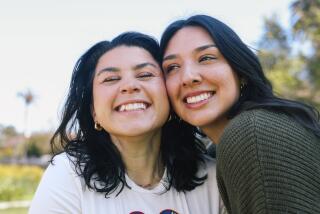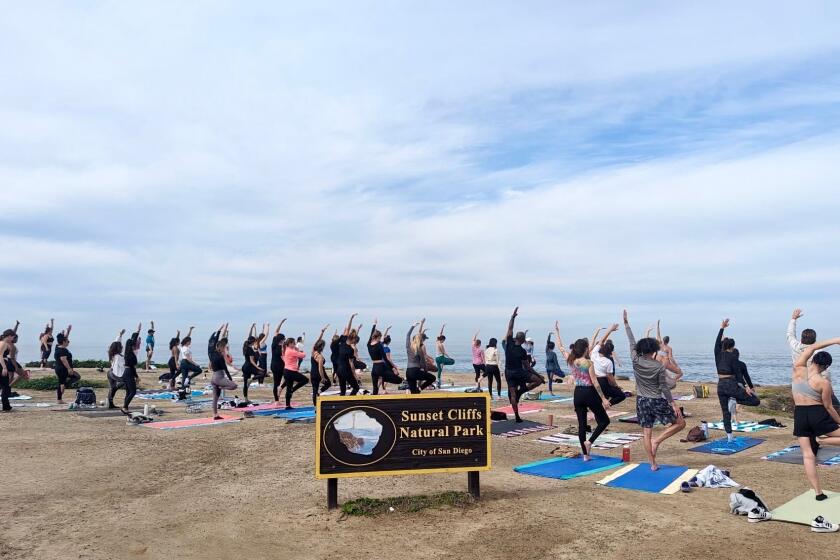Forums Help Break Down Ethnic Barriers
Talin Janjikian remembers being nervous about moving to the United States. The soft-spoken teen-ager was 14 years old when her parents decided to join her aunts, uncles and grandparents in Glendale.
Soon after she arrived, however, her fears were quickly allayed. The city’s large Armenian culture welcomed Janjikian, her younger brother and parents with open arms.
“They were very warm and there were so many of us,” she said of the largest Armenian population outside of Armenia.
Janjikian, now a 19-year-old premed student at Glendale Community College, said it was not until recently that she realized that the security she found in that tight-knit ethnic group made it unnecessary for her to seek non-Armenian friends, keeping her exposure to Glendale’s ethnic blend of residents at a minimum.
But lately, things have changed for Janjikian. For the last four weeks, she has spent two hours each Wednesday night meeting with residents from a variety of cultural backgrounds as part of the city-sponsored Glendale Community Forum.
The meetings, which began Oct. 14 and ended Wednesday, were intended to promote understanding and cultural tolerance by bringing different people together to discuss issues that affect the entire city.
For Janjikian, it helped her realize that she had “some personal prejudices” toward other cultures, which she says were unfounded.
“This forum gave me a chance to talk with people I don’t hang around with--older people and people from different ethnic backgrounds,” she said. “And now I realize we all have the same values. That surprised me.”
The forum, “Understanding Who We Are,” is the fifth series since 1989 and is co-sponsored by Glendale Community College, Sammons Communications and Glendale-based Spanish television, KVEA-TV Channel 52.
As in past forums, this year’s participants were organized into four groups. Each group met weekly at one member’s home, where they took turns discussing homelessness, the importance of family, youth issues and individual community involvement.
“We find out what people want to talk about and use suggestions from previous forums,” said Donna Metzler, an administrative associate to City Manager David Ramsay and one of the forum’s organizers. “We tend to pick topics that are timely and will generate good discussions.”
Each session began with introductory remarks by two experts in the field, followed by free-flowing conversation among participants.
During the meeting on family values, members of Janjikian’s group began the discussion by sharing their family experiences. By the end of the meeting, group members agreed that “health, happiness and peace” were ultimate goals of all people and that everyone deserved an equal chance of attaining those goals.
“We’re all from somewhere else,” Norm Allen, a native of Texas, summarized for the group. “Just because some of us got here 200 years earlier doesn’t mean we deserve more.”
The forums resulted from recommendations to improve racial relations in Glendale suggested by a private consultant and attorney hired by the city. The consultant, Herman Sillas, suggested the forums as one remedy to improve relations ordered by a federal judge who found that a Latino police officer had been improperly refused promotions in the Glendale Police Department.
Participants included business leaders, homemakers, students, blue-collar workers and professionals. Participants were nominated in previous sessions or simply signed up, Metzler said.
The program seeks no solutions. It is designed to promote discussions and enable participants to get to know one another better.
“Then they can bring what they learn back to their business groups, families and ethnic organizations,” Metzler said.
In this fall’s sessions, the conversations ranged from the cultural roots of volunteerism to the difficulty of getting to know newcomers.
“It seems to me volunteerism is pretty much a North American way of life,” said Carmen Paz of Bolivia. “And for all of us who were not brought up with the concept, how do you get us involved?”
Rozanna Sarian, a Glendale Community College student who immigrated from Syria in 1983, said children are one answer.
“It starts with the kids teaching their parents how important it is,” she said. “I came to this country when I was 10 years old and I started volunteering. Now my mom volunteers. Kids have a lot to teach adults.”
Susan Seabeck, a participant in another group, said she found the meetings empowering, especially the discussion on youth.
“At the first meeting, we were talking about gangs, which is a real concern,” she said. “You’re all wound up and tense, with feelings of hopelessness. Then, by the end of the meeting, you felt like, ‘Wow! there really is something you can do.’ It was very stimulating, there’s hope out there.”
Seabeck said a personal turning point came when she admitted to her group that she often feels like an outsider in the city she grew up in because of its many immigrants.
“I find it frustrating because I want to learn about them, and people seem so suspicious and don’t want to talk.”
After discussing her confession with the group, Seabeck said she has since decided to learn some Armenian phrases.
“It would be nice to go up to somebody on the street and say, ‘Hello, how are you?’ in their language,” she said. “That might start a conversation and that might be the barrier to break down. You would be making an effort to reach out to them.”
Bob Torres, a Montrose businessman and unsuccessful City Council candidate in 1988, has participated in two forums. He said the program would be even more beneficial to the community if participants had a way to share discussion topics with the city.
“As soon as you leave and get to your car door, the energy is gone,” he said.
Janjikian agreed: “So many people had so many ideas and were willing to put the effort into it, but there wasn’t a way of helping. I think what we can do in this forum is go out and actually help--like providing food for a night for homeless people.”
“I think it would be a great idea to have another forum like that,” Metzler said. “But I don’t know when that will happen. We want to keep this in the pure sense of increasing communication. Once you start putting a decision-making thrust on it, the barriers start to rise.”
More to Read
Start your day right
Sign up for Essential California for news, features and recommendations from the L.A. Times and beyond in your inbox six days a week.
You may occasionally receive promotional content from the Los Angeles Times.





